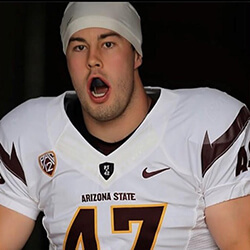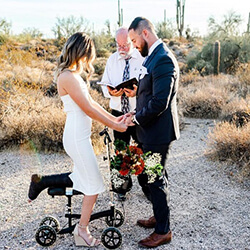White Coat Profile: Jordan Henderson
Meet Jordan Henderson

Growing up in Snowflake and Payson, Arizona, as the son of a retired rural physician, Victor Henderson, MD, he already had a strong sense of commitment to rural communities and was inspired to pursue a medical career of his own after watching his father treat neighbors and friends. Those experiences lent him an understanding on how much rural patients rely upon the town’s only physician.
“I have seen health disparities in people who live in rural areas,” said Henderson. “It really hurts to see the people that raised me, supported me and taught me in classes, and then realize they are not getting the same medical care that I got when I was at college and lived in Phoenix. I want to be a voice for these people and be in a position to speak up for them,” Henderson added.
It was his experience as a football coach at his alma mater ASU that also helped steer his path.
“I noticed instead of coaching, I started getting lots of health-related questions from the players and then from the other coaches about their health. I would try to find ways to improve player health to prevent injuries.”
Henderson applied and was accepted into the University of Arizona College of Medicine – Phoenix Class of 2025 — the largest class to date with 120 students. According to Glen Fogerty, PhD, MBA, associate dean of Admissions and Recruitment, this class represents one of the most academically gifted to apply to medical school in the nation — with many of them entertaining multiple acceptances to medical school.
“I think the biggest thing that I am most excited about medical school is being able to study at the University of Arizona College of Medicine – Phoenix. It’s a privilege to be able to learn medicine with and to be a part of this class of people who come from such diverse backgrounds. It will be good to hear different perspectives, which will help my understanding of other people's experiences,” said Henderson.

He is looking forward to the White Coat Ceremony and also to his future. Henderson hopes to return to rural Arizona after residency.
“White Coat represents all the people who've been in my corner. So many people have helped me and mentored me along the way. They are rooting me on and supporting me to be able to put on a white coat. It’s really a demonstration of the people — the family and friends — around me and the sacrifices they have made to propel me forward.”
About the College
Founded in 2007, the University of Arizona College of Medicine – Phoenix inspires and trains exemplary physicians, scientists and leaders to advance its core missions in education, research, clinical care and service to communities across Arizona. The college’s strength lies in our collaborations and partnerships with clinical affiliates, community organizations and industry sponsors. With our primary affiliate, Banner Health, we are recognized as the premier academic medical center in Phoenix. As an anchor institution of the Phoenix Bioscience Core, the college is home to signature research programs in neurosciences, cardiopulmonary diseases, immunology, informatics and metabolism. These focus areas uniquely position us to drive biomedical research and bolster economic development in the region.
As an urban institution with strong roots in rural and tribal health, the college has graduated more than 1,000 physicians and matriculates 130 students each year. Greater than 60% of matriculating students are from Arizona and many continue training at our GME sponsored residency programs, ultimately pursuing local academic and community-based opportunities. While our traditional four-year program continues to thrive, we will launch our recently approved accelerated three-year medical student curriculum with exclusive focus on primary care. This program is designed to further enhance workforce retention needs across Arizona.
The college has embarked on our strategic plan for 2025 to 2030. Learn more.